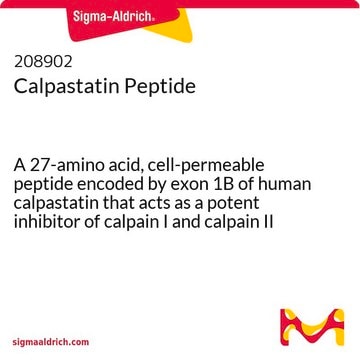662125
Ubiquitin Isopeptidase Inhibitor I, G5
The Ubiquitin Isopeptidase Inhibitor I, G5, also referenced under CAS 108477-18-5, controls the biological activity of Ubiquitin Isopeptidase. This small molecule/inhibitor is primarily used for Protease Inhibitors applications.
Synonyme(s) :
Ubiquitin Isopeptidase Inhibitor I, G5, 3,5-bis((4-Nitrophenyl)methylene)-1,1-dioxide, tetrahydro-4H-thiopyran-4-one, NSC-144303
About This Item
Produits recommandés
Niveau de qualité
Pureté
≥97% (HPLC)
Forme
solid
Fabricant/nom de marque
Calbiochem®
Conditions de stockage
OK to freeze
protect from light
Couleur
yellow
Solubilité
DMSO: 10 mg/mL
Conditions d'expédition
ambient
Température de stockage
2-8°C
Description générale
Actions biochimiques/physiologiques
Ubiquitin isopeptidase activity
Conditionnement
Avertissement
Reconstitution
Autres remarques
Aleo, E., et al. 2006. Cancer Res.66, 9235.
Informations légales
Code de la classe de stockage
11 - Combustible Solids
Classe de danger pour l'eau (WGK)
WGK 2
Point d'éclair (°F)
Not applicable
Point d'éclair (°C)
Not applicable
Certificats d'analyse (COA)
Recherchez un Certificats d'analyse (COA) en saisissant le numéro de lot du produit. Les numéros de lot figurent sur l'étiquette du produit après les mots "Lot" ou "Batch".
Déjà en possession de ce produit ?
Retrouvez la documentation relative aux produits que vous avez récemment achetés dans la Bibliothèque de documents.
Contenu apparenté
Select different protease inhibitor types based on your needs to prevent protein degradation during isolation and characterization and safeguard proteins in sample prep.
Notre équipe de scientifiques dispose d'une expérience dans tous les secteurs de la recherche, notamment en sciences de la vie, science des matériaux, synthèse chimique, chromatographie, analyse et dans de nombreux autres domaines..
Contacter notre Service technique







